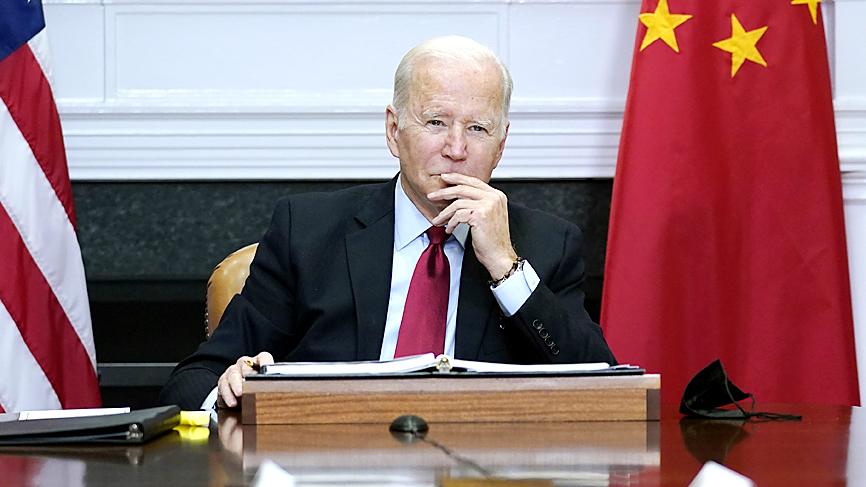The US on Thursday unleashed a volley of actions to censure China’s treatment of Uighurs, with lawmakers voting to curb trade and new sanctions slapped on the world’s top consumer drone maker.
The US Senate unanimously voted to make the US the first country to ban virtually all imports from China’s Xinjiang region over concerns of the prevalence of forced labor.
“We know it’s happening at an alarming, horrific rate with the genocide that we now witness being carried out,” said US Senator Marco Rubio, a driver behind the act, which already passed the House of Representatives and which the White House says US President Joe Biden will sign.

Photo: AP
After prolonged negotiations to secure its passage, Rubio lifted objections and the Senate confirmed veteran diplomat Nicholas Burns as ambassador to China.
Burns, a widely respected former ambassador to Greece and NATO, and a professor at Harvard, has called the treatment of Uighurs “genocide,” and described China as an “aggressor” in its relationship with Taiwan, Japan, the Philippines and Vietnam.
“Our responsibility is to make Taiwan a tough nut to crack,” Burns said, while rejecting a suggestion that the US ditch its longstanding policy of “strategic ambiguity,” which does not say whether it would intervene in an invasion of Taiwan.
Some US businesses had voiced unease about the Uyghur Forced Labor Prevention Act, which bans the import of all goods from the region unless companies offer verifiable proof that production did not involve slavery.
Xinjiang is a major source of cotton, with an estimated 20 percent of the garments imported each year into the US including some material from the region.
Rights experts, witnesses and the US government say that more than 1 million Uighurs and other Muslims are incarcerated in camps.
The Biden administration also fired off a round of sanctions over surveillance in Xinjiang, where rights groups say China has been honing new technologies to keep tabs on Uighurs.
Companies hit by US Department of the Treasury sanctions include SZ DJI Technology, by far the world’s largest producer of consumer drones of the type used in filmmaking and aerial photography, with more than 70 percent of the global market.
The US had already restricted trade exports to the company, but the new sanctions would criminalize any US investment in it.
The US Department of Commerce also restricted sensitive exports to the Chinese Academy of Military Medical Sciences and 11 of its research institutes over biotechnology work, including “purported brain-control weaponry,” a notice said.
Additional reporting by Bloomberg

CHAOS: Iranians took to the streets playing celebratory music after reports of Khamenei’s death on Saturday, while mourners also gathered in Tehran yesterday Iranian Supreme Leader Ayatollah Ali Khamenei was killed in a major attack on Iran launched by Israel and the US, throwing the future of the Islamic republic into doubt and raising the risk of regional instability. Iranian state television and the state-run IRNA news agency announced the 86-year-old’s death early yesterday. US President Donald Trump said it gave Iranians their “greatest chance” to “take back” their country. The announcements came after a joint US and Israeli aerial bombardment that targeted Iranian military and governmental sites. Trump said the “heavy and pinpoint bombing” would continue through the week or as long

TRUST: The KMT said it respected the US’ timing and considerations, and hoped it would continue to honor its commitments to helping Taiwan bolster its defenses and deterrence US President Donald Trump is delaying a multibillion-dollar arms sale to Taiwan to ensure his visit to Beijing is successful, a New York Times report said. The weapons sales package has stalled in the US Department of State, the report said, citing US officials it did not identify. The White House has told agencies not to push forward ahead of Trump’s meeting with Chinese President Xi Jinping (習近平), it said. The two last month held a phone call to discuss trade and geopolitical flashpoints ahead of the summit. Xi raised the Taiwan issue and urged the US to handle arms sales to

State-run CPC Corp, Taiwan (CPC, 台灣中油) yesterday said that it had confirmed on Saturday night with its liquefied natural gas (LNG) and crude oil suppliers that shipments are proceeding as scheduled and that domestic supplies remain unaffected. The CPC yesterday announced the gasoline and diesel prices will rise by NT$0.2 and NT$0.4 per liter, respectively, starting Monday, citing Middle East tensions and blizzards in the eastern United States. CPC also iterated it has been reducing the proportion of crude oil imports from the Middle East and diversifying its supply sources in the past few years in response to geopolitical risks, expanding

Pro-democracy media tycoon Jimmy Lai’s (黎智英) fraud conviction and prison sentence were yesterday overturned by a Hong Kong court, in a surprise legal decision that comes soon after Lai was jailed for 20 years on a separate national security charge. Judges Jeremy Poon (潘兆初), Anthea Pang (彭寶琴) and Derek Pang (彭偉昌) said in the judgement that they allowed the appeal from Lai, and another defendant in the case, to proceed, as a lower court judge had “erred.” “The Court of Appeal gave them leave to appeal against their conviction, allowed their appeals, quashed the convictions and set aside the sentences,” the judges